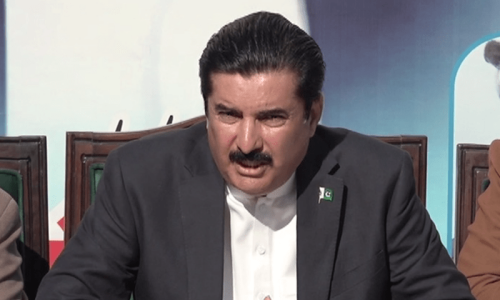PESHAWAR: The Peshawar High Court asked the attorney general for Pakistan and the advocate general of Khyber Pakhtunkhwa on Thursday to be present during the next hearing of a petition challenging inclusion of the Army Act, 1952, and the Official Secrets Act, 1923, in an FIR registered against a number of individuals for allegedly firing at army centres in Mardan after the arrest of PTI chief Imran Khan on May 9.
A two-judge bench of the PHC gave the order during the hearing of a petition filed by 28 protesters arrested after the May 9 mayhem.
They prayed to the court to order the removal of section 59 of the Army Act and section 3 of the Official Secrets Act from the FIR registered against them by the Mardan police.
The bench, consisting of Justice Isthiaq Ibrahim and Justice Sahibzada Asadullah, slated the next hearing for June 13.
The 28 petitioners requested the court to declare the inclusion of the Army Act and the Official Secrets Act ‘double jeopardy against Article 13 of the Constitution, read with section 403 of the Code of Criminal Procedure’.
Shah Faisal Utmankhel appeared for the petitioners and informed the court that due to countrywide strike over the killing of a lawyer in Quetta, he was unable to argue the matter.
He requested the bench to fix an early date for hearing preferably on Friday (Jun 9) for arguments over the issue.
Additional Advocate General Danyal Khan Chamkani, who represented the provincial government, said an anti-terrorism court had already ordered handing over of seven of the suspects to military authorities.
He stated the petitioners should have also challenged the ATC’s order.
Legal questions
Shah Faisal Utmankhel said the matter had thrown up important legal questions, especially whether a civilian could be tried by a military court without amending the Constitution.
He added that specific amendments had been made in the Constitution through the 21st and the 23rd Amendments to authorise trial of certain categories of civilians by military courts. He added, however, that the amendments lapsed in 2019.
The respondents in the petition are the federal government through the attorney general for Pakistan, Khyber Pakhtunkhwa government through its chief secretary, the KP inspector general of police, the provincial home secretary, and the provincial IG (prisons).
The petitioners stated that initially, neither section 59 of the Army Act nor section 3 of the Official Secrets Act were part of the FIR.
They recalled a 2009 judgement of the Supreme Court in a similar case which declared that police cannot register an FIR under civilian laws as well as the Army Act since it would amount to double jeopardy — a violation of fundamental rights provided under Article 13 of the Constitution, read with section 403 of the CrPC.
The petitioners contended that Article 14 of the International Covenant on Civil and Political Rights, to which Pakistan was a signatory, held that trying civilians in military courts was contrary to international laws.
Published in Dawn, June 9th, 2023














































Dear visitor, the comments section is undergoing an overhaul and will return soon.